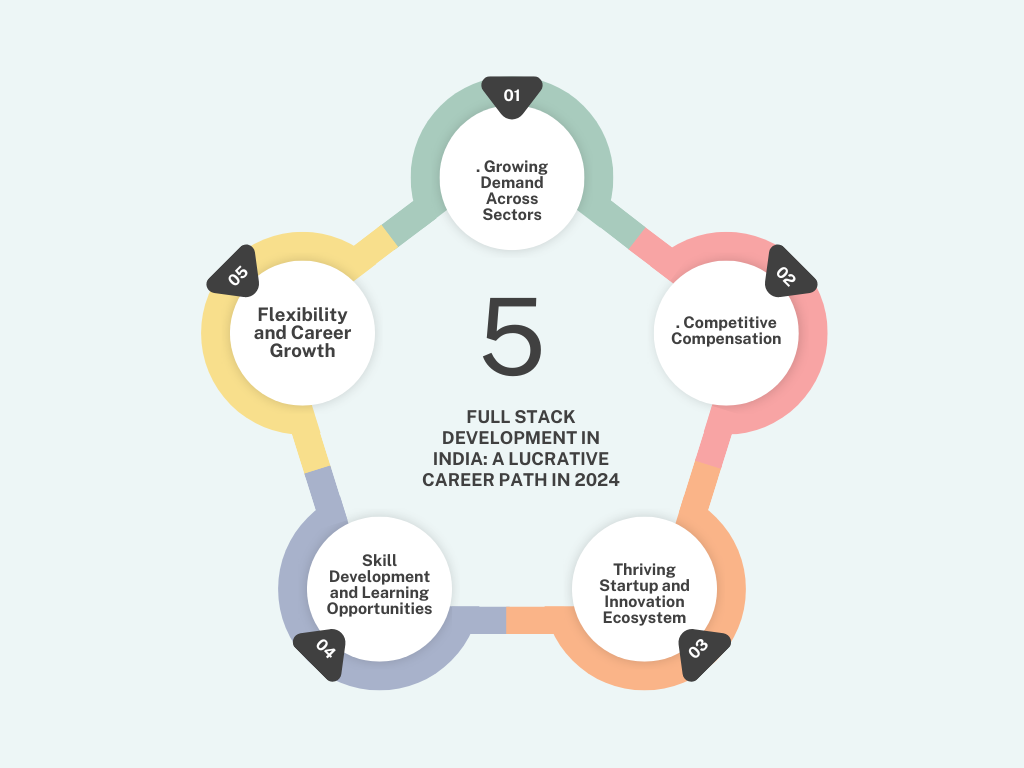Full stack development continues to be one of the most in-demand and rewarding career choices in India. As technology evolves, companies seek versatile developers capable of handling front-end and back-end development. Here’s why full stack development offers significant potential in 2024, supported by key statistics:

Full stack development continues to be one of the most in-demand and rewarding career choices in India. As technology evolves, companies seek versatile developers capable of handling front-end and back-end development. Here’s why full stack development offers significant potential in 2024, supported by key statistics:
1. Growing Demand Across Sectors
- IT Industry Expansion: India’s IT sector is set to grow from $227 billion in 2022 to approximately $350 billion by 2026. This surge fuels the demand for full stack developers who can contribute to end-to-end development.
- Startup Ecosystem Growth: India is home to over 90,000 startups, the third-largest ecosystem globally. Many startups prefer hiring full stack developers to optimize costs and streamline operations.
- Industry Applications: Sectors like e-commerce, healthcare, and fintech are projected to grow by 15-20% annually, creating a need for developers who can build robust, scalable solutions.
2. Competitive Compensation
- Salary Trends: According to industry reports, the average salary for full stack developers in India ranges from ₹6-12 lakh per annum for beginners. Mid-level professionals earn around ₹15-20 lakh, and senior roles can fetch ₹25 lakh or more.
- Regional Differences: In tech hubs like Bengaluru, Hyderabad, and Pune, salaries can be 20-30% higher than the national average. Remote work opportunities also allow developers to tap into international markets.
- Freelancing Potential: The global freelance market is projected to grow by 15% annually, and Indian full stack developers are well-positioned to capitalize on this trend, often earning in dollars or euros.
3. Thriving Startup and Innovation Ecosystem
- Investment Influx: Indian startups attracted over $24 billion in funding in 2023, a clear sign of robust growth and the need for skilled developers.
- Government Initiatives: Programs like Digital India and Startup India promote digital transformation, increasing demand for full stack developers to build and maintain digital infrastructure.
- Versatile Roles: Startups value full stack developers because they can handle multiple aspects of development, reducing the need for larger teams.
4. Skill Development and Learning Opportunities
- Upskilling Trends: Over 70% of tech professionals in India are actively pursuing courses in full stack development, with popular platforms like Udemy and Coursera reporting a 40% increase in enrolments.
- Certifications: Certification programs have become essential, with many companies preferring candidates with credentials in frameworks like React.js, Angular, Node.js, and Python.
- Coding Bootcamps: Specialized bootcamps have seen a 30% rise in enrolment, highlighting the demand for structured, hands-on learning.
5. Flexibility and Career Growth
- Versatile Roles: Full stack developers can transition into roles such as software engineers, technical leads, project managers, or even entrepreneurs.
- Remote Work: The remote work trend has expanded opportunities, allowing Indian developers to work with international companies and earn competitive global salaries.
- Career Satisfaction: According to a recent survey, 85% of full stack developers in India expressed high job satisfaction due to diverse projects and continuous learning.
Key Technologies in Demand:
- Front-End: React.js, Angular, and Vue.js.
- Back-End: Node.js, Python (Django/Flask), and Java (Spring Boot).
- Databases: MySQL, MongoDB, and PostgreSQL.
- DevOps: Docker, Kubernetes, AWS, and Azure.
Full stack development remains a highly lucrative and promising career path in India for 2024. With strong industry growth, competitive salaries, and abundant learning resources, full stack developers are well-positioned to thrive. As digital transformation accelerates across sectors, the demand for versatile developers will only continue to rise.
